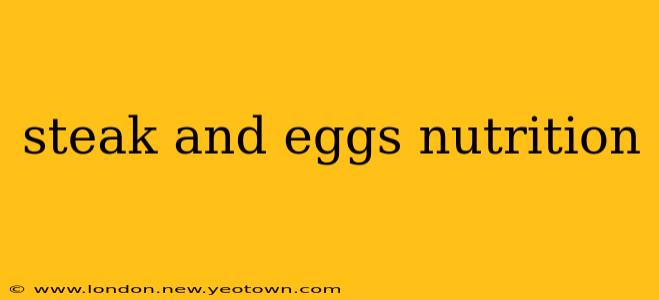The classic combination of steak and eggs—a breakfast champion, a hearty brunch, or a satisfying late-night meal—holds a certain undeniable appeal. But beyond the delicious taste, what's the nutritional story behind this protein-packed duo? Let's delve into the nutritional breakdown, exploring the benefits and potential downsides of this beloved pairing.
Imagine this: the sizzle of a perfectly seared steak, the golden-yellow richness of perfectly fried eggs, the burst of flavor... It's a culinary experience that transcends the mundane. But what exactly are we consuming, nutritionally speaking? Let's break it down.
Steak: The Protein Powerhouse
Steak, primarily composed of lean protein, is a nutritional powerhouse providing essential amino acids crucial for muscle building and repair. The type of steak, its cut, and preparation significantly impact its nutritional profile. A leaner cut like sirloin will offer more protein and less fat compared to a richer cut like ribeye. However, even leaner cuts contain saturated fat, so moderation is key.
Nutritional highlights of a typical 3-ounce sirloin steak (cooked):
- Protein: ~22 grams - Essential for muscle growth and repair.
- Iron: A good source of heme iron, readily absorbed by the body. Important for oxygen transport and energy production.
- B Vitamins: Niacin, riboflavin, and B12 contribute to energy metabolism and nerve function.
- Zinc: Supports immune function and wound healing.
Eggs: A Nutritional All-Star
Eggs, often overlooked for their nutritional depth, are a nutritional all-star. The yolk, often avoided due to its cholesterol content, is actually packed with beneficial nutrients. While dietary cholesterol isn't as demonized as it once was, moderation remains crucial.
Nutritional highlights of a large egg (whole):
- Protein: ~6 grams - A complete protein, containing all nine essential amino acids.
- Choline: Essential for brain health and liver function. Often lacking in many diets.
- Vitamin D: Crucial for calcium absorption and immune function.
- Selenium: An antioxidant that protects cells from damage.
What are the benefits of eating steak and eggs?
This dynamic duo offers a compelling combination of benefits:
- High Protein: A significant source of protein crucial for satiety, muscle building, and overall health.
- Essential Nutrients: Provides a wealth of vitamins and minerals, including iron, B vitamins, choline, and selenium.
- Energy Boost: The combination of protein and healthy fats provides sustained energy.
Are there any potential downsides to eating steak and eggs?
While generally healthy, consuming steak and eggs regularly presents some potential drawbacks:
- High Saturated Fat: Steak, especially richer cuts, contains significant amounts of saturated fat, which can negatively impact cholesterol levels if consumed excessively.
- High Cholesterol: The yolk contains cholesterol, though its impact on blood cholesterol is less significant than previously thought. Still, moderation is wise for those with high cholesterol concerns.
- Sodium Content: Depending on preparation methods (especially if salted or using sauces), sodium content can be high. This is a consideration for individuals watching their sodium intake.
How many calories are in steak and eggs?
The calorie count varies significantly depending on the size and type of steak, the number of eggs, cooking methods, and additions like butter or oil. A typical serving (3-ounce steak and 2 eggs) could range from 350-500 calories.
What are some healthier ways to prepare steak and eggs?
To optimize the nutritional profile, consider these healthier preparation methods:
- Choose leaner cuts of steak: Opt for sirloin, tenderloin, or flank steak.
- Grill, bake, or pan-fry with minimal oil: Avoid deep-frying.
- Use healthy cooking methods: Grilling or baking are better choices than frying.
- Control portion sizes: Be mindful of your serving sizes to manage calorie and fat intake.
- Add vegetables: Include a side of vegetables like spinach, asparagus, or mushrooms to increase nutrient intake and fiber content.
Is steak and eggs a good breakfast?
Steak and eggs can be a part of a healthy breakfast, but it depends on your overall diet and individual health needs. The high protein content can promote satiety, reducing cravings later in the day. However, the high saturated fat and cholesterol content mean it shouldn't be a daily occurrence for everyone.
Ultimately, the nutritional value of steak and eggs depends on the quality of the ingredients, the portion sizes, and how it fits into your overall dietary pattern. Enjoy this delicious pairing in moderation as part of a balanced and varied diet.

